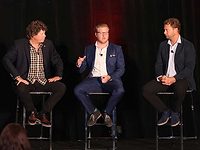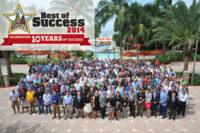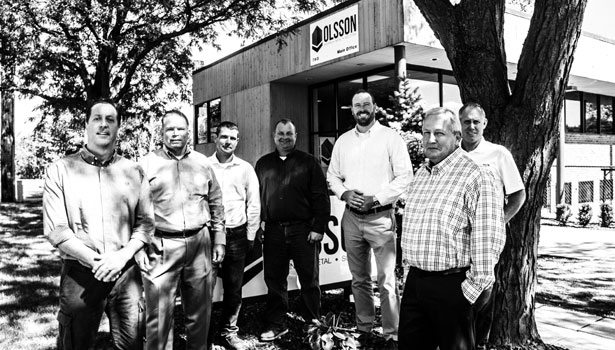100 Years and Counting: Olsson Roofing Builds on a History of Bringing Out the Best in People

Olsson Roofing Company’s principal owners include (from left) Tom Brueck, Mike Herlihy, Dan Pattermann, Chris Laube, Shawn Sullivan, Bill Lynch (foreground) and Jeff Thompson. Photo by Ryan J. Bolger.


Recent projects include Suit Supply in Chicago.

Hampshire High School in Hampshire, Ill.

Olsson Roofing has been a fixture in the Chicago area, tackling tough projects such as this roof for the Chicago Transit Authority.

The company thrives on difficult projects with multiple scopes of work. Pictured is UNO Charter High School in Chicago. Photo courtesy of Olsson Roofing.






Olsson Roofing Company will celebrate its 100th anniversary this month at its headquarters in Aurora, Ill. Bill Lynch, one of the company’s principal owners, noted that while everyone at Olsson is proud of the achievement, their focus is firmly on the future.
“There’s a great deal of pride in all of our employees,” Lynch said. “One of the things we emphasize is that while 100 years is a milestone, it’s not the end of the race in any way, shape or form. One thing that you have to guard against always is complacency. You can’t get complacent. The market is constantly changing, so we have to keep challenging ourselves internally and externally to keep reinventing the company.”
Lynch credits the company’s previous owner, Bill Glenn, with helping to create an atmosphere that continues to bring out the best in the company’s employees. “Bill Glenn did a great job with that,” said Lynch. “That’s the culture he created, and I just came in after the fact and bought into the concept, and we’ve just taken it to the next level.”
The principal owners today include Bill Lynch, Jeff Thompson, Mike Herlihy, Shawn Sullivan, Chris Laube, Dan Pattermann and Tom Brueck. They strive to continue the company’s tradition of tackling tough projects, doing quality work and earning the trust of their clients. They also hope to keep building on a legacy of providing a challenging work environment for employees, keeping them safe and rewarding their hard work and initiative.
A Century of Success
Lynch, Thompson, Herlihy and Glenn recently shared their insights on the company with Roofing Contractor. According to Glenn, who served as president of the company from 1972 until his retirement in 2003, Olsson Roofing was founded in 1914 in St. Charles, Ill., by Nils Olsson, a Swedish immigrant. Olsson ran the company for more than 40 years before he passed it on to Glenn’s father, William Glenn, a key employee who had come on board in the 1930s.
The younger Glenn grew up around the business, learning to drive the car on back roads while his dad went on sales calls. He planned to pursue a different career path after graduate school, but when his father had a heart attack he joined the company, eventually buying his father out and becoming president. In 1972, Glenn asked a classmate from college, Cleve Carney, to join him as a partner to help expand the company. As the suburbs of Chicago grew, Olsson Roofing reorganized and added staff members to allow the company to make the most of its opportunities. Key employees included Lynch, who headed up the company’s financial department; Thompson, who ran operations; and Herlihy, who oversaw estimating and project management.
“One of the things that made us unique is that the head guy wasn’t the guy who made all the decisions,” Glenn recalled. “I said, ‘If I’m going to run this company, we’re going to have to have people who are accountable and responsible.’ And that’s what we did. That’s what’s changed our company. We grew it in an organized way with a business plan that spelled out what we had to do on an annual basis.”
Lynch and Glenn met by chance while both were vacationing in Florida. Lynch and his wife were paired with Glenn and his wife at a golf outing. The two hit it off. Lynch, the CFO at Furnace Electric, had no prior construction experience, but Glenn thought he would be a good fit at the company. Lynch joined the company in 1997 as its CFO, thanks in part to that chance encounter. “I remind my wife of that every time I go golfing,” Lynch said.
Lynch wasn’t sure about the transition, but Glenn convinced him it would work. Lynch recalled, “When I came to work for Bill, I told him, ‘I don’t know anything about construction.’ He said, ‘I can teach you about construction. You understand business. I have guys on the construction side of it who can handle that part. I need leadership.’”
The company set up separate departments for new construction, re-roofing and service to increase profitability and track performance. “One of the things I learned while I was getting used to this business is that you really have different customers in new construction, re-roof and service,” said Lynch. “Each of them is uniquely different. As we were looking at the company at that time — and we wanted to grow the company — we said we had to have a much more intense focus on who our customers were in each of those respective markets.”
The focus paid off in many ways, Glenn recalled. “One of the things I loved most about my job was that I had created a company that had responsive people in departments running their own areas, so I could get out and meet a lot of people,” he said. “We were able to create a lot of networks, and that helped us grow in terms of opportunities.”
When Glenn started to think about retirement, he and the management team crafted a succession plan. Lynch, Thompson and Herlihy became the principal partners, purchasing Glenn’s share of the business. In 2003, the partners also set up an Employee Stock Ownership Plan (ESOP) to give all employees a chance to have a stake in the company.
“That was a big milestone because we had a lot of employees that had been here a long time and they were very active in the business, and we felt that it was appropriate to reward them for all of their loyalty and hard work by creating the ESOP side of the equation,” Lynch said.
According to Lynch, the company’s stock value has increased approximately 250 percent in the 10 years since the ESOP was set up. “When you have that kind of success with the company, it’s easy to get employees to buy in and see why this was functionally done and why it’s a benefit to them,” he said.
“It’s the People”
Asked what the company’s greatest strength is, the partners all pointed to its employees. “Without question, it’s the people,” Lynch said. “We have a very limited turnover for a construction company. It’s not unusual, for instance, for our field foremen to have 20 or 25 years of experience, but they’re here for a reason — we take good care of our people. We treat them with respect. They know that they are going to be working for a quality company. There is a great deal of pride in it. We have all basically thought since the day we came to work here that this was our company, and certainly in 2003, with the creation of the ESOP, all of the employees have that chance to realize that.”
Thompson noted that the company has a history of not only providing opportunities for advancement, but helping employees get there. “As the company grew, new positions and new jobs were created, and the majority of those positions were filled with people from within the company,” he said. “I went back to school in the evenings, and the company took care of my school bills. It’s been a great company from that standpoint. They are always encouraging people and helping people succeed.”
Employees are encouraged to explore new opportunities, according to Lynch. “There is a lot of cross-training and movement of people,” he said. “My philosophy — and the company has embraced it — is if you’ve got a good person, you need to find the right spot for them. Don’t try to take a square peg and jam it into a round hole. We try to play to the strengths of our people.”
Herlihy pointed out that the company’s diversity of perspectives and educational backgrounds has inherent benefits. “One thing that has worked very well for us in each of the different leadership structures that we’ve had over the past 15 years is that none of us think alike,” he said. “It’s a challenge, but it’s an incredible opportunity, too. We learn to trust each other, and it works.”
The company is always looking for an edge, and all employees contribute. The company has quarterly meetings to discuss how the business is doing. “We keep them informed about general things and challenge them to cut overhead and improve cash flow,” said Lynch. “They embrace those challenges and come back with solid recommendations on ways to do things differently. We encourage that type of innovation in our employees, no matter what the task is.”
Roofing is a dangerous business, so safety has to always be the top priority, noted Thompson. “Safety, quality and production — that’s how it’s always been at this company,” said Thompson.
His most satisfying moment occurs when his employees go home safely to their families when the shift is over. “That’s our goal each and every day,” Thompson said.
Herlihy agreed. “Safety is a culture,” he said. “Safety is a behavior. It’s not a process. It’s not a prescription. People have to understand what the risks to themselves and the risks to others are. If they do that, and understand it, the behaviors come naturally.”
Rising to the Occasion
The company is especially suited to tackle tough projects, noted Lynch. “Because of the strong backgrounds of several of my partners, and their strength in the roofing industry, we like to take on extremely difficult and challenging projects, which in some instances a number of our competitors won’t even look at,” he said. “We in fact relish in those different types of opportunities because we think we have ways to add a lot of value engineering to the job.”
Tricky projects have included tear-offs and re-roofs over manufacturing plants, data centers, and large shopping malls with expensive equipment and inventory. “You get in those very tough situations, you prove yourself, and the customer either invites you back to do other projects with them or through word of mouth they refer you to other general contractors or private businesses,” Lynch said.
The company is also ready to react quickly in an emergency, noted Herlihy. He recalled being notified about a major retailer’s new roof being damaged during a high-wind event just a few days before its grand opening. Herlihy got the call at 1:30 a.m. and was on the site a half hour later. “By 6 a.m., we had a game plan to get a temporary roof on that building to the satisfaction of the building user and the municipality,” he said. “That was a Wednesday morning. We completely flood tested the roof by Saturday, and they had their grand opening on Sunday.”
“We’ve had a number of those emergencies for customers over the years, and it makes you feel good to go in and get their operations running and get them watertight again after something severe like that,” Thompson said. “That’s one of our huge strengths — when someone has a problem, we can get them a roof and get them watertight very quickly.”
The company also excels at creative problem solving, according to Herlihy. “One thing we’ve done on several buildings is we’ve taken the existing roof system on a structurally sloped building with internal drains and reconfigured it and redesigned it to move the drainage to the perimeter of the building so that the space inside the building could be used as data center space without any water overhead,” he said.
“The real fun comes in taking on the unique-challenge jobs and focusing on solving the problem,” Herlihy continued. “If you do that and you pay attention to the numbers in the process, you end up with an ecstatic customer — and you probably made a buck along the way, too.”
100 Years of Quality
The recipe for success in roofing is pretty simple, according to Glenn. If your business is going to stand the test of time, the roofs you install have to do so as well. “That’s all you need in this business — to be honest, to have a good product and to stand behind it,” Glenn said. “That’s what we did. That’s what we still do.”
Lynch pointed out that a handful of other roofing companies in the Chicago area have been around for 100 years, so the milestone might not be unique, but it is a cause for celebration. He credits the hard work and dedication of everyone at the company for Olsson’s success.
“The most satisfying part of it is the ownership that each of the employees have taken in this particular business,” said Lynch. “This is not just a job to them, it’s a career, and you can see it with your people. They will do almost anything, without you even asking, in order to do their job better and make the company more successful. That’s a very, very gratifying positon to be in, to see that kind of effort coming from your people literally on a daily basis. Basically, they all give a damn.”
Looking for a reprint of this article?
From high-res PDFs to custom plaques, order your copy today!














